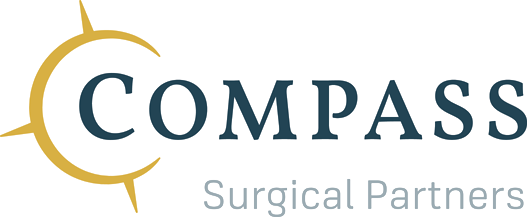Strong Anesthesia Partners and the Migration of Complex Cases to ASCs
w/ Will Bok, MD, Providence Anesthesia Associates
The Outpatient Compass: Interview #1
The Outpatient Compass is a discussion series exploring key topics in the world of ASCs. Each month, members of the Compass Surgical Partners team will interview our key staff, physician partners, vendors, and others with in-depth industry knowledge. With so much anticipated growth of ASCs in the coming years, we believe sharing important ideas and concepts will benefit everyone seeking to deliver high-quality care in the ASC setting.

The Importance of Strong Anesthesia Partners and the Migration of Total Joint Replacement and Spine Surgery to ASCs
Will Holding (Compass): Having worked in both hospitals and surgery centers, and having worked with a lot of surgeons, what do you think holds surgeons back from being more engaged in outpatient surgery?
Will Bok (Providence Anesthesia): Surgeons are creatures of habit. It's hard to change our practice, and historically total joints and spines and larger surgeries have been inpatient hospital procedures, due to acuity, fear of blood loss, pain control, lots of variable factors. But over the past ten years, between surgical technique, improvements in regional and ambulatory pain management, patient selection, patient identification, patient education, we realized these surgeries can be done successfully in the ambulatory realm. Once we can educate surgeons, we get the chain effect - surgeons learning from each other. We're starting to see the fear of change - the fear of new - go away and these procedures really expand. It's real exciting.
Holding: In surgery centers, what common problems do you face with regards to patient selection, and what's your role as anesthesia provider?
Bok: Orthopedic surgeon colleagues look on us from the medical side to ensure patients are screened properly. In general as the criteria for Ambulatory Surgery got less restrictive over time, we realized that we needed data, and we really need to be looking at the patient as a whole. What procedure are we doing? What surgical technique are we doing? What are all the medical factors? We really decide whether we think it's appropriate or not. The surgeons look to us to be that gateway, that center of approval.
For joints, if you look at the literature, at first it was 30% of the total joints outpatient, then 50%, and now we're seeing 70%. So we're realizing that these can be done safely, and the criteria can be similar to other outpatient procedures. 40 or 45 BMI cutoffs are common for us now. We encourage the surgeons to encourage weight loss and get below that 40 number, but they still can be done successfully. Obviously, your cardiac comorbidities we take very seriously.
Holding: Do you think there will be a need for overnight observation moving forward, or do you think through the newer techniques, through education, through screening, etc., that approach will be unnecessary?
Bok: Absolutely less necessary moving forward. It's really an information-gathering technique. That's the biggest step. Once you set a process in place and that's reliable, you've screened your patient well. So when we set up overnight observations, it's usually to give the surgeon a bit of a security blanket for a procedure that they're not used to doing in a new environment.
In our ASCs, so far we have yet to have a patient spend the night. The patients have all done very well. That's not to say they won't ever stay overnight, but as the facility pre-operative process gets smoother, we expect to see very little of it. Unless it's a new procedure. We're starting to see ALIFs done, and backs and spines, you know the first few times, maybe they'll be 23-hour ops, just to keep everyone happy and comfortable.
Holding: What happens in the next five to ten years? What kind of advancements do you see in outpatient surgery in general? Where do we go from here?
Bok: We just saw that CMS approved for Medicare total hips and total shoulders. In spine, we're seeing more and more approvals as well. There will be a limit of course. Particularly if you're talking spine surgery, once you get to a certain level of fusion, then you run into issues with blood loss. However, I think we'll hit 50% in an ambulatory setting, though that may not all be freestanding ASCs.
Holding: So much of surgical medicine is moving toward outpatient. How do you stay up to speed in learning new techniques that will facilitate this shift? What has been key to facilitating the shift?
Bok: At Providence we have great relationships with academic medical centers in our area and we stay in touch with them on the latest and greatest. With innovation, there are always certain things that really shift the curve. For anesthesia, there have been many, but for outpatient, the ultrasound has been the biggest innovator for us. All the motor sparing regional ambulatory techniques would not be possible without ultrasound. It was there in the early 2000s, ramped up throughout the 2000s, but really it’s just continued to take off.
Holding: Whether it's general surgery groups or orthopedic groups, how should surgeons vet out the right kinds of anesthesia groups to partner with to deliver efficient, quality experiences?
Bok: It’s easy to lose sight of it while we're talking about all this innovation and collaboration, but the number one thing you should gauge is whether anesthesia groups keep the patient number one. Because ultimately the reason we're doing all this—moving cases to the ambulatory realm and taking care of these patients—is to put the patient first. As you talk to groups, you really want to kind of get a sense: where are they invested? We've developed our own quality initiatives, our own quality reporting system, our own metrics and databases and long-life pathways. If a group is reinvested in themselves like this, they're doing that to keep the patient first.
Then number two thing is ambulatory experience. You definitely want to have a group that has ambulatory experience. Someone had to do it the first time, but at this point you really should have somebody who's done it before. All these things are really what you want to look for, because you're looking for a partner. You're looking for someone to help grow the business, keep the patient first and make it a success for everyone.
Recent News
-
Bon Secours Mercy Health and Compass Surgical Partners Announce Grand Opening of World-Class Surgery Center in Greenville, South Carolina
-
Healthcare Trailblazers: The Compass Surgical Partners Journey
-
Proactive Payer Credentialing Preps Your New ASC for Financial Success
-
Advanced Joint and Spine Institute Orlando and Compass Surgical Partners Open World-Class Orthopedic Surgery Center
-
How Your Health System Can Win the CV ASC Market
Copyright © 2024 Compass Surgical Partners
Site Design by Swarm Interactive | Admin Login
